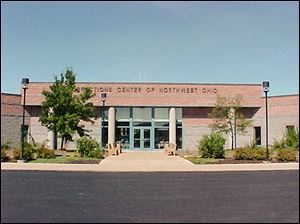
Progress in justice reform to be touted in Lucas Co.
5/8/2017Toledo Municipal Judge Tim Kuhlman will lead a discussion about Lucas County’s procedural justice efforts in Denver today for a gathering of jurisdictions receiving funding from the John D. and Catherine T. MacArthur Foundation.
Last year, the county was among 10 jurisdictions across the country selected for grants ranging from $1.5 million to $3.5 million over two years to reduce jail populations and address racial and ethnic disparities in justice systems.
The MacArthur Foundation’s Safety and Justice Challenge is designed to have communities invest in strategies to reduce the average daily jail population over a three-year period.

Local authorities hope to reduce the prison population at the Corrections Center of Northwest Ohio at least 16 percent by 2018.
Among the strategies implemented by Lucas County for its $1.75 million grant is to allow eligible inmates to be released on electronic monitoring devices and the use of risk-based assessments to determine the public-safety risk they pose and the chance they will commit new crimes, Judge Kuhlman said.
“We do risk assessment on everybody who is at [the Corrections Center of Northwest Ohio] and identify people as low risk. That helps us identify people who can be released early from their sentences,” he said.
A committee of county commissioners, public defenders, police and sheriff officers, common pleas and municipal court judges, and other county and city officials has set a goal of downsizing the jail population by at least 16 percent by 2018.
The group’s strategic plan also calls for providing treatment and housing alternatives for inmates with mental health and drug and alcohol dependencies.
Joining Judge Kuhlman will be eight county officials involved in the courts and criminal justice system, including county commissioner Carol Contrada.
Mrs. Contrada said the Denver seminar will be the first time that all 40 jurisdictions will be in attendance for a Safety and Justice Challenge conference.
“This is a wonderful time to collaborate and share on what has worked and what hasn’t worked and what needs more work,” she said.
Since receiving the grant in April, 2016, Judge Kuhlman said Lucas County has trained employees, including those in the sheriff’s department, municipal court judges staff, and Toledo Municipal Court employees, on the concept of using “procedural justice” for the people going through the courts and jail.
“Procedural justice is a different and better way for the criminal justice system to work with the public,” he said.
According to Judge Kuhlman, the principles of procedural justice include giving people the opportunity to be heard, exercising neutrality and consistent decision-making that includes understanding, and making sure people know that decisions are made with treating people with a level of respect to which everyone is entitled.
“What the research clearly shows, when we deal with the public in that matter, people have a greater tendency to voluntarily comply with decisions made by authorities. We don’t have to use threats or threats of force to ensure compliance with our decisions,” Judge Kuhlman said.
Judge Kuhlman said the measures implemented for the Safety and Justice Challenge Grant are reducing the overall inmate population at the county jail and the regional jail in Stryker, Ohio. He said Toledo Municipal Court operations are more streamlined and there’s less chaos in the administration of justice for people charged with crimes than in past years.
The county jail, he said, is more efficiently managed that it was two years ago or even five years ago.
“I feel a lot more comfortable with the tools we have now. We are being fair and just while looking out for public safety. We are now keeping the right people in jail and getting everybody else out,” he said. “I think everybody agrees it is bad for our community to have people in jail who shouldn’t be in jail and shouldn’t need to be in jail. It costs taxpayers money we don’t need to be spending. It also causes people to lose stability, lose their housing, lose their jobs, and lose education opportunities and as a result people are in worse positions and therefore the community is in a worse position.”
Mrs. Contrada said the conference will focus on the jurisdictions’ efforts to address mental health and substance and alcohol issues related to their jail populations. Communities are using interesting and innovative ways to address such issues, she said.
Contact Mark Reiter at: markreiter@theblade.com or 419-724-6199.